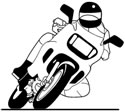 Motorcycles, like passenger cars, are capable of high speeds and must share the road with other vehicles. However, unlike passenger cars, motorcycles are capable of rapid accelerations, offer little protection to the operator during a collision and require special skills to maneuver effectively. This is due in part, to the use of separate front and rear brake controls and the gyroscopic effects of the front wheel, which necessitate a "counter-steering" technique to initiate a rapid change of direction. Motorcycle accidents may also involve helmet considerations, conspicuity to other motorists and many principles used in conventional four-wheeled vehicle accident reconstruction.
Motorcycles, like passenger cars, are capable of high speeds and must share the road with other vehicles. However, unlike passenger cars, motorcycles are capable of rapid accelerations, offer little protection to the operator during a collision and require special skills to maneuver effectively. This is due in part, to the use of separate front and rear brake controls and the gyroscopic effects of the front wheel, which necessitate a "counter-steering" technique to initiate a rapid change of direction. Motorcycle accidents may also involve helmet considerations, conspicuity to other motorists and many principles used in conventional four-wheeled vehicle accident reconstruction.
Expertise
At Technology Associates our testing, research and analysis capabilities include:
- Wheelbase crush to determine speed
- Motorcycle braking analyses
- Helmet effectiveness studies
- Momentum and energy calculations
Questions Answered
Through scientific analysis, we can help you answer pertinent questions such as:
- How fast was the motorcycle going?
- Why didn't the car driver see the approaching motorcycle?
- Did the motorcycle rider brake effectively?
- Would the use of a helmet have reduced the rider's injuries?
Case Examples
Obstacle on Highway:
A large piece of furniture fell off a pickup truck onto a busy three-lane highway. An approaching car and motorcycle avoided striking the furniture but the driver of the car then lost control and began spinning along the highway, causing a collision with the motorcycle. Based on a detailed accident reconstruction, we showed that despite the motorcycle's maneuverability, the rider could not have reasonably been expected to avoid striking the car, which acted as a moving target traveling in an unpredictable motion.
Motorcycle and Left Turning Car:
A sedan making a left turn with a green light at a signalized intersection collided with an oncoming motorcycle, causing the rider to be thrown over the car and suffer fatal injuries. Prior to the impact, the motorcycle rider applied his brake, creating a 58' skid mark. Technology associates performed a motorcycle braking analysis, which revealed that the rider only used his rear brake prior to the collision and had he performed a proper application of both brakes, the impact would have been avoided.
Kristopher J. Seluga, PE, is a Mechanical Engineering, Accident Reconstruction, Biomechanics, and Safety Expert with over 20 years of experience. He received his Bachelor's and Master's degrees from the Mechanical Engineering department at MIT where he worked on the development of novel three-dimensional printing technologies. Mr. Seluga is also a licensed Professional Engineer in New York and Connecticut, and has served as a member of the ANSI engineering committee for the Z130.1 and Z135 standards for golf cars and PTV's. His research interests and peer reviewed publications span the topics of Motor Vehicle Dynamics, Product Safety, and Biomechanics.
©Copyright - All Rights Reserved
DO NOT REPRODUCE WITHOUT WRITTEN PERMISSION BY AUTHOR.



 Motorcycles, like passenger cars, are capable of high speeds and must share the road with other vehicles. However, unlike passenger cars, motorcycles are capable of rapid accelerations, offer little protection to the operator during a collision and require special skills to maneuver effectively. This is due in part, to the use of separate front and rear brake controls and the gyroscopic effects of the front wheel, which necessitate a "counter-steering" technique to initiate a rapid change of direction. Motorcycle accidents may also involve helmet considerations, conspicuity to other motorists and many principles used in conventional four-wheeled vehicle
Motorcycles, like passenger cars, are capable of high speeds and must share the road with other vehicles. However, unlike passenger cars, motorcycles are capable of rapid accelerations, offer little protection to the operator during a collision and require special skills to maneuver effectively. This is due in part, to the use of separate front and rear brake controls and the gyroscopic effects of the front wheel, which necessitate a "counter-steering" technique to initiate a rapid change of direction. Motorcycle accidents may also involve helmet considerations, conspicuity to other motorists and many principles used in conventional four-wheeled vehicle 






